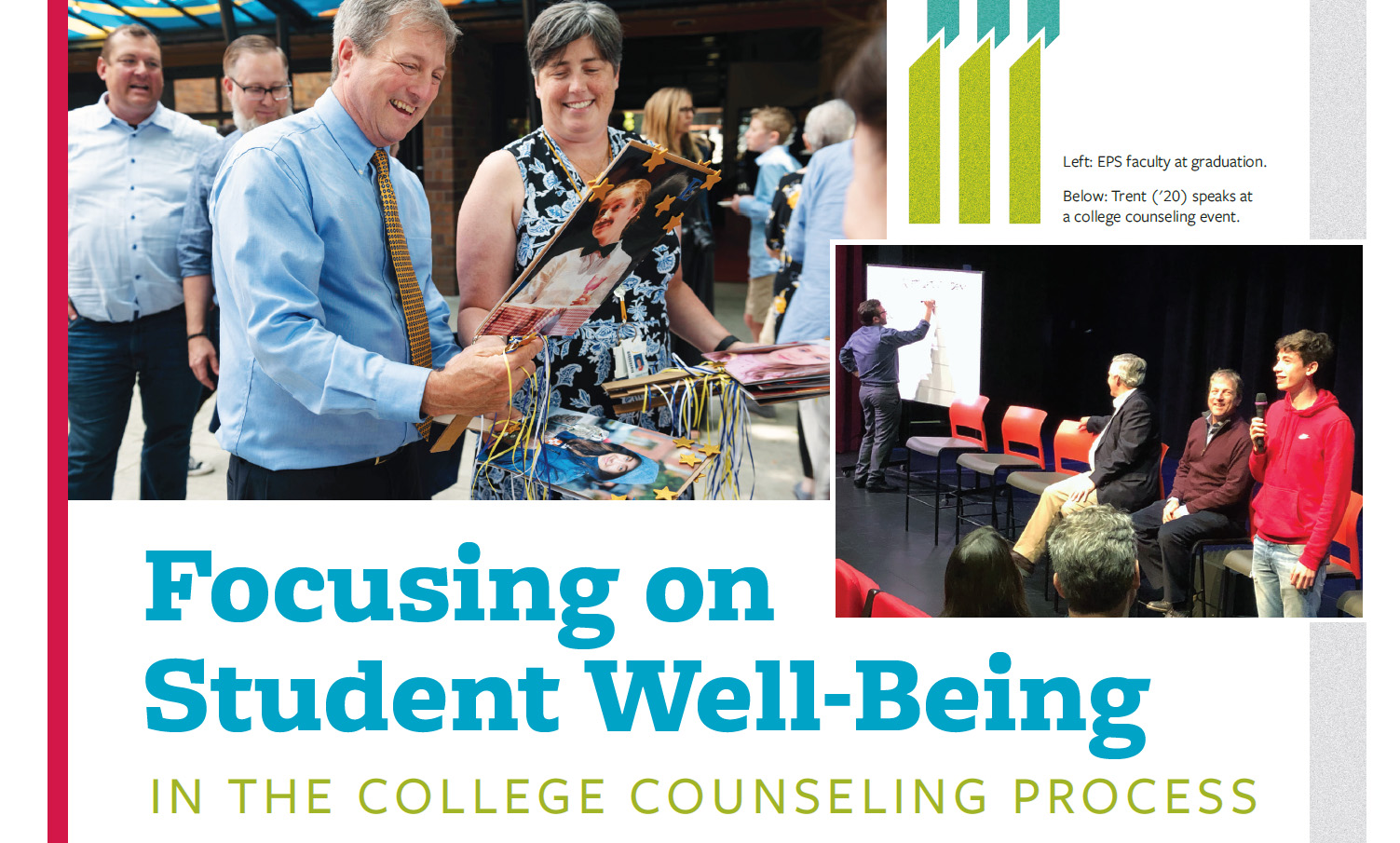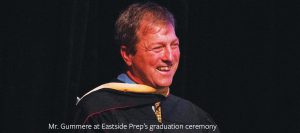
By Bart Gummere, Associate Head of School for College Counseling and Alumni Relations
I STARTED MY CAREER AS A COLLEGE COUNSELOR IN THE summer of 1986. I was coming out of a three-year stint as an admission officer at Middlebury College in Vermont and now had a new title: Director of College Counseling at Pingree School, in a suburb north of Boston. I always laughed a bit at the title…it was an office of one. And I was at an age when it was a struggle to direct myself, much less a whole program.
I now direct a program of college counseling staffed by six other professionals and me. Over the course of my thirty-three years, college counseling in independent schools has grown dramatically in scope and sophistication. Almost no school has a lone college counselor, as well as the preparation of students for college admission, and the focus on those outcomes, has grown immensely.
The pressures that led independent schools to direct more resources into their college counseling programs have changed high schools everywhere, public and private. More to the point, those pressures have had immense impact on the key inhabitants of those schools—students.
To understand the impact, one must first understand the changing landscape of college admission over the past thirty-plus years. In 1986, admission to the most “elite” colleges was definitely competitive. But it looked little like it does today. Some of the most selective colleges had admission rates around 20%. Today, fourteen have admission rates of under 10% and an additional thirty-six between 10-20%. There are record numbers of applications at institutions every year, and it is not just students applying to more schools. The diversity of admission pools now has grown immensely with both international students and domestic applications for groups once unrepresented.
All of this leads to a more unpredictable world for high school seniors as they apply, which leads to more pressure felt by even ninth-grade students. Some argue that the result should be schools working harder to develop students ready for such competition. Eastside Prep endeavors to put each student in a strong position for both college admission and college success. However, our students’ well-being is paramount, and the most important role we take as a school is to develop students with confidence, resilience, and perspective who can navigate such a world without becoming obsessive or filled with anxiety. Striking the right balance is a challenge.
 One of the reasons I’m excited for my new focus on college counseling and alumni relations is to put even more focus on this issue, and be sure we are instilling those desired traits. As it exists, there are plenty of signs of a healthy atmosphere. Our students apply to, and matriculate at, a large variety of colleges and universities. In our eleven graduating classes, 315 graduates have attended 139 different institutions. This is significant, as it indicates that students are not following each other, but rather making individual choices. Herd mentality is one sign of an unhealthy college process.
One of the reasons I’m excited for my new focus on college counseling and alumni relations is to put even more focus on this issue, and be sure we are instilling those desired traits. As it exists, there are plenty of signs of a healthy atmosphere. Our students apply to, and matriculate at, a large variety of colleges and universities. In our eleven graduating classes, 315 graduates have attended 139 different institutions. This is significant, as it indicates that students are not following each other, but rather making individual choices. Herd mentality is one sign of an unhealthy college process.
EPS makes an effort not to treat each college choice as a marketing opportunity. Highlighting admission to the nation’s most selective colleges can promote a subtle but significant message: attending some places is more valuable than others.
Frank Bruni of the New York Times writes frequently on higher education. His book, Where You Go Is Not Who You’ll Be, details the lack of connection between success and happiness in life and the selectivity of the college one attends. It should be required reading for students and parents as they enter the college search. The subtitle of Bruni’s book, “an antidote to the college admission mania,” seems even more prescient in the wake of the more recent “Varsity Blues” admission scandal. The disconnect on what is important in college is ever widening, with far too many people attached to the name more than the experience.
Our interest here centers on two points: helping students reflect throughout their high school career on who they are as individuals, and then helping match that reality with institutions which will best foster their further development and growth. What one does in college is almost always more important than where one does it. This leads to my frequently uttered maxim, “The act of making the choice is more important than the choice itself.”
Beyond the specifics of academic study, college offers a chance for many young adults to transition between life with their parents to life on their own. Launching from home after successfully graduating from college is hardly a given for those who enroll in any college or university. Six-year graduation rates are around 59% nationally. (Be warned that four-year rates are much lower!) The focus of any college preparatory school should always be much more on preparing students for their post-high-school experience than on putting them in the best marketing position for admission. These two things are unfortunately not 100% aligned. We also work hard to help students to trust their own hearts on fit, and not be pressured by the rankings, official or otherwise, set by others. Those who have their trust usually feel most empowered once on that campus. There also would be a strange irony were EPS students unwilling to choose a lesser known option that feels right over a name-brand that does not.
One of my happiest moments this past year came when I received an email in late May. It came from a 2015 EPS grad, with a picture attached of her broadly smiling in cap and gown having graduated that day (on-time in four years). The note expressed appreciation for us having stuck with her in high school and drew direct connection between her experience at EPS and her success in college. Nothing means more to me. Hopefully all EPS students feel well prepared and highly supported in their time at our school. The college search process should always keep these happy ends in mind. Overall, students go off, do well wherever they attend, feel justifiably proud of their accomplishments, and find many options ahead—be they career or graduate school. EPS does all it can to help students get through this process efficiently, effectively, and happily.

